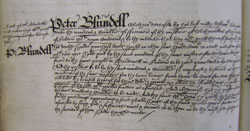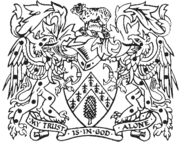Peter Blundell (d.1601) bequeathed £150 to The Clothworkers’ Company to purchase property to the annual value of forty shillings.[1] The Company purchased a house in Friday Street with the money. Blundell was a clothier and philanthropist from Tiverton in Devon.[2] He had no particular association with The Clothworkers’ Company, and is not believed to have been made free of the City.[3] He did, however, have wide involvement in the cloth industry, owning and developing a factory to manufacture kerseys in his home town of Tiverton.[4] He never married, and lived much of his life there. He had at least two siblings, James, who predeceased him, and a sister, who had a son, Robert Chilcott, who was mentioned in his will.[5] He is believed to have lived in Lombard Street during his stays in the City, where he most likely boarded with Mrs. Anne Whitemore, a widow, and her family, all of whom he remembered in his will.[6] He requested that he be buried in the Church of St. Michael Paternoster on his death.[7]
 Blundell had a vast fortune. His biographer, Joyce Youings, notes how he made cash bequests to the value of £32,000 in his will.[8] This would amount to over half a million pounds in today’s money. Amongst these bequests, he granted £1000 to Anne Whitemore and £500 to each to her three sons.[9] He granted £500 to Christ’s Hospital and £250 to St. Bartholomew’s Hospital to purchase lands and housing for the poor children who lived there.[10] He also granted £50 for repairs to Tiverton Church, while monies were also directed towards the maintenance and upgrading of highways in Devon, which were central to the kersey industry there.[11] His most detailed bequest governed the establishment of a new free school at Tiverton, which was to cater for no more than 150 students at any one time.[12] The students had to have been born in Tiverton, and were not allowed entry to the school until they reached six years of age.[13] He granted all of his lands in Devon to a number of feoffees, including Sir Francis Popham, to keep in trust, and to lease at their discretion. The monies generated from the properties were to be used for a series of charitable causes including the support of the new free school, and the establishment of a scholarship scheme for four boys from Tiverton to be educated in husbandry for seven years.[14]
Blundell had a vast fortune. His biographer, Joyce Youings, notes how he made cash bequests to the value of £32,000 in his will.[8] This would amount to over half a million pounds in today’s money. Amongst these bequests, he granted £1000 to Anne Whitemore and £500 to each to her three sons.[9] He granted £500 to Christ’s Hospital and £250 to St. Bartholomew’s Hospital to purchase lands and housing for the poor children who lived there.[10] He also granted £50 for repairs to Tiverton Church, while monies were also directed towards the maintenance and upgrading of highways in Devon, which were central to the kersey industry there.[11] His most detailed bequest governed the establishment of a new free school at Tiverton, which was to cater for no more than 150 students at any one time.[12] The students had to have been born in Tiverton, and were not allowed entry to the school until they reached six years of age.[13] He granted all of his lands in Devon to a number of feoffees, including Sir Francis Popham, to keep in trust, and to lease at their discretion. The monies generated from the properties were to be used for a series of charitable causes including the support of the new free school, and the establishment of a scholarship scheme for four boys from Tiverton to be educated in husbandry for seven years.[14]
By his will he granted £150 to each of the twelve great Livery Companies of the City of London to purchase lands.[15] The Clothworkers’ received this grant with the proviso that they purchase a property that would have an annual value of at least forty shillings. From this money, the Company were directed to pay an annual stipend to the Bridewell of forty shillings, and to use the rest for costs accrued in administering these lands.[16]
[1] TNA PROB 11/97 and 11/98, Will of Peter Blundell, 6 June 1599.
[2] Youings, Joyce, ‘Biography of Peter Blundell’, www.dnb.com, (Date Accessed: 8 October 2010).
[3] Ibid.
[4] Ibid.
[5] Ibid.
[6] TNA PROB 11/97 an 11/98, Will of Peter Blundell, 6 June 1599.
[7] Ibid.
[8] Youings, ‘Biography of Peter Blundell’, www.dnb.com,
[9] TNA PROB 11/97 an 11/98, Will of Peter Blundell, 6 June 1599.
[10] Ibid.
[11] Ibid.
[12] Ibid.
[13] Ibid.
[14] Ibid.
[15] Ibid.
[16] Ibid.
